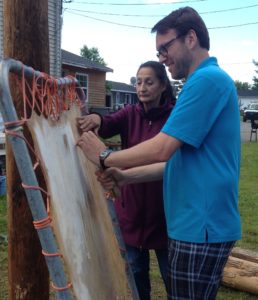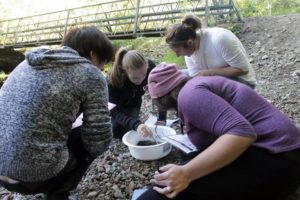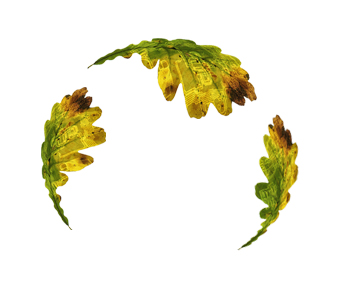The Bachelor of Education at Cape Breton University (CBU) in Sydney, NS has recently developed a Sustainability Concentration for some of the program participants. This concentration came out of rising focus on sustainability education that works hand-in-hand with the efforts to Indigenize the curriculum. The melding of Indigenous and sustainability education came together in ways that were expected because of the many intersections of these two approaches to teaching and learning, namely through community- and place-based education.

Figure 1 – Elder Sharon Paul shares how to prepare a hide with a teacher candidate
In order to develop the four courses that represent the concentration in sustainability, the program leads, over time, connected with local First Nations communities. The Eskasoni Mi’Kmaw Nation is about 40 km outside of Sydney and Membertou Nation is in Sydney. The new program emerged in 2009, and the leads knew they wanted First Nations education included, so they reached out to the communities and created dialogue. A First Nations concentration also emerged, with the focus on language preservation – also a strong sustainability issue – so the four course concentration in FN emerged at the same time as sustainability. Both evolved and intertwined organically.
Mi’Kmaq speaking teachers in those communities are invited to come in to the teacher education classrooms, and the teacher candidates are sent out to take trips to special places, like Goat Island, where they work with Elders to learn about medicinal herbs, edible plants, the significance of these in the local traditions, and other traditional practices. This offers opportunities for pedagogies that model opportunities to work with elders in their communities and nature spaces, creating very special and experiential aspects, to listen, partake and participate. For many students, especially the majority who are white settlers, this makes the abstract, concrete. These experiences are really exciting for them and for the instructors.
The Sustainability concentration includes a core course in Education for Sustainability and a course on Problem-based/integrated learning. The concentration shows up on their transcripts. CBU continues to focus on Indigenizing the curriculum broadly, focusing on local issues, which “naturally” fits with sustainability as well.

Figure 2 – Students engaged in outdoor inquiry/based learning strategies
It’s a learning journey for the program leads as well! As courses are developed and delivered, new relationships are built, they are modelling the process through the program development itself.
As Patrick noted, as teachers, we can get caught up with planning and outcomes, and the non-Indigenous students can have discomfort with allowing experiences to arise. Planning it all is not the best way, because it can cause a lot of tension. We are all products of our education system, so for everyone the act of taking some risks and seeing what will happen next, provides great reward through letting go and being present. The positive outcomes for students and instructors show the organic blend and power of ESE to help facilitate the Indigenizing of the curriculum.
Patrick Howard is an Associate Professor of Education in the School of Professional Studies at Cape Breton University. He is a ‘lead’ on the Education for Sustainability Concentration in the B.Ed and co/lead for the M.Ed in Sustainability, Creativity, Innovation (SCI) For more information: Patrick_Howard@cbu.ca


So, what do you think ?